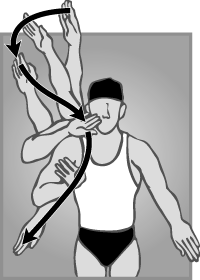|
Click on
a red triangle to see the answer.
All Questions are from the publication
The
Sporting Life
unless otherwise indicated.
This list was last updated November 12, 1997
|
|

|
Why do my muscles sometimes burn when I'm excercising?
|

|
Why do I feel sore the day after I exercise?
|

|
What happens to my heart when I exercise?
|

|
What is "VO2 max" and how does it measure cardiovascular fitness?
|
 What's the best position for my hands when I swim freestyle?
What's the best position for my hands when I swim freestyle?
|
|
If you learned to swim before the mid-1970s (and maybe later, depending
on the coach), you were probably taught to pull your hand straight backward
through the water like a canoe paddle. With this stroke, you move forward
by pushing against the water. It turns out that's not the best way to propel
yourself through the water. Today's swimmers learn to follow an S-shaped
pattern (see diagram below), a more natural motion that has more in common
with a propeller than a paddle.
|
|
With the S-shaped motion, the edge of your hand splits the water flowing
past it into two streams, much like what happens when an airplane wing cuts
through the air. Some water goes over the back of your hand and some goes
under it. This split generates a lift, which propels you forward in the
water, similar to the way a propeller's wing-shaped blades push a boat forward.
We tend to think of lift in terms of moving you upward (as is the case with
an airplane), but lift can be generated in any direction, depending on the
orientation of the hand (or wing) that creates it. Expert swimmers continuously
adjust the angle of their hands throughout the stroke to maximize the forward-directed
lift. This lift means a swimmer can go faster with less effort using the
S-shaped stroke. You can almost "fly" through the water.
|

|

|
How high can you jump?
|

|
Why do long jumpers "run" several steps in the air after they
take off?
|

|
How does ice help a sprained ankle or other injury?
|

|
How important is my grip on the bat when I'm striking the ball?
|

|
Why does spinning a ball make it curve?
|

|
How does Michael Jordan manage to hang in the air for so long when he
goes up for a slam dunk?
|
|


